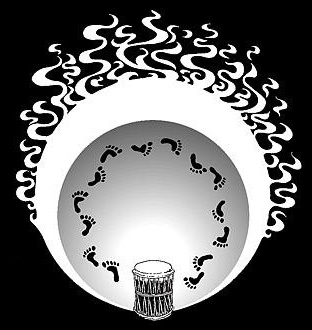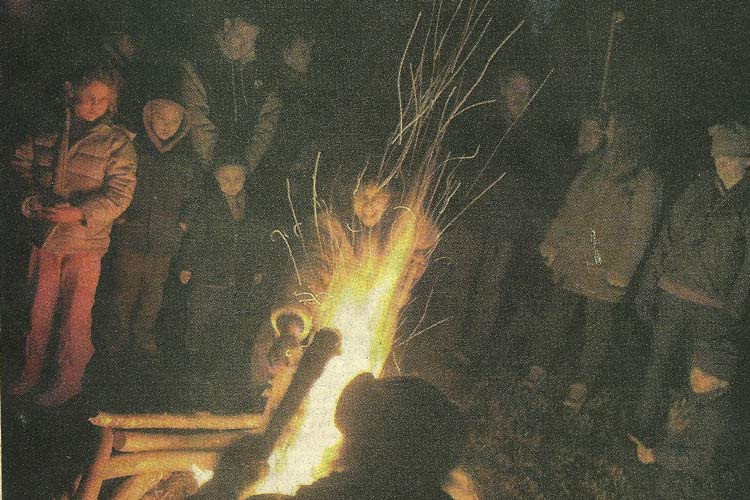Solstice Fires
Since 2000, Earth Drum Council has hosted Summer and Winter Solstice Fire celebrations as the firekeepers and drummers, in collaboration with the Musketaquid Arts and Environment Program in Concord, MA.
The Art of Transformation: Around the Fire
by Morwen Two Feathers
The fire flickered, flames leaping and undulating, blazing heat melting the surrounding snow. Overhead the swaying trees danced with the stars. A few feet from where we stood the river flowed, bearing silent witness in the frigid night. It was Winter Solstice, and nearly 200 intrepid people had hiked into the woods to celebrate the rebirth of the sun at the darkest time of year.
Members of Musketaquid, a Concord-based organization dedicated to linking arts and the environment, had planned this evening of song, poetry, and ritual theatre as an offering to the local community. The previous weekend some had met to construct figures of branches and dried plants to offer to the fire. Now I watched as sticks were passed out and people were invited to put a wish into their stick and give it to the fire. I stepped forward and placed my figure onto the blaze. More were added and the fire rose higher, until its light and heat radiated out to the farthest reaches of the circle, illuminating the smiling faces gathered there. As singing rose to meet the fire, I felt transported to an ancient time.
Long ago, the collective life of the community was made coherent with celebrations like this. Attuning to nature’s cycles and the cycles of human life, tribal cultures gathered regularly to sing, dance, play music, and tell stories. There was no "audience." Culture was not a spectator sport. Every member of the tribe, even babies bundled on their parent’s backs, was a participant in creating the tribe’s culture. Everyone with a body danced. Everyone with a voice sang.
We can imagine that there must have been individuals with exceptionally beautiful voices, or particular talent for music or dance. Yet in tribal cultures, these people are not singled out to perform for the others. They are not made into "stars." Instead they lend their talents to lead and inspire the group to bring its collective energy even higher.
Somewhere along the line in western culture, this changed. Role differentiation is a hallmark of cultural development. As the division of labor proceeds in economics, so does it develop in the arts. Individuals specialize. Music, dance, drawing, storytelling, become something done by the few for the entertainment of the many. The role of audience is born.
We can look around and see the resulting fragmentation of modern life. We can look inside and feel it. Entire industries are built upon the professionalization of art, the creation of audience which is also market. This can be observed in other areas of society as well: business, politics, and religion all have audiences in the form of consumers, citizens, and congregations. Celebrities and experts capture our attention and define our reality. Sometimes it seems we are spectators of our own lives.
There is growing recognition that our culture is in need of healing, being made whole. And while I’m not suggesting that the answer to our cultural fragmentation is to stop patronizing the arts, I do think that one way we can begin to reconnect that which has become disconnected is to stop watching and participate together in singing, dancing, music-making, story-telling, and creating beauty.
Standing around the bonfire singing with my neighbors, I felt part of a tribe. It didn’t matter that some of the singing was off-key. The community is strong enough to hold all the voices. Now, as the waters rise with melting snow, the seed planted that Winter Solstice night is quickening. My roots in this community grow deeper. I’m looking forward to meeting you around the fire in the days to come.







